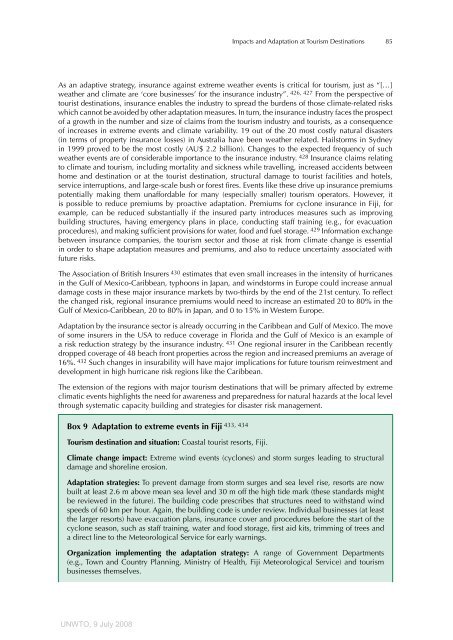Climate Change and Tourism - UNEP - Division of Technology ...
Climate Change and Tourism - UNEP - Division of Technology ...
Climate Change and Tourism - UNEP - Division of Technology ...
You also want an ePaper? Increase the reach of your titles
YUMPU automatically turns print PDFs into web optimized ePapers that Google loves.
UNWTO, 9 July 2008<br />
Impacts <strong>and</strong> Adaptation at <strong>Tourism</strong> Destinations<br />
As an adaptive strategy, insurance against extreme weather events is critical for tourism, just as “[…]<br />
weather <strong>and</strong> climate are ‘core businesses’ for the insurance industry”. 426, 427 From the perspective <strong>of</strong><br />
tourist destinations, insurance enables the industry to spread the burdens <strong>of</strong> those climate-related risks<br />
which cannot be avoided by other adaptation measures. In turn, the insurance industry faces the prospect<br />
<strong>of</strong> a growth in the number <strong>and</strong> size <strong>of</strong> claims from the tourism industry <strong>and</strong> tourists, as a consequence<br />
<strong>of</strong> increases in extreme events <strong>and</strong> climate variability. 19 out <strong>of</strong> the 20 most costly natural disasters<br />
(in terms <strong>of</strong> property insurance losses) in Australia have been weather related. Hailstorms in Sydney<br />
in 1999 proved to be the most costly (AU$ 2.2 billion). <strong>Change</strong>s to the expected frequency <strong>of</strong> such<br />
weather events are <strong>of</strong> considerable importance to the insurance industry. 428 Insurance claims relating<br />
to climate <strong>and</strong> tourism, including mortality <strong>and</strong> sickness while travelling, increased accidents between<br />
home <strong>and</strong> destination or at the tourist destination, structural damage to tourist facilities <strong>and</strong> hotels,<br />
service interruptions, <strong>and</strong> large-scale bush or forest fires. Events like these drive up insurance premiums<br />
potentially making them unaffordable for many (especially smaller) tourism operators. However, it<br />
is possible to reduce premiums by proactive adaptation. Premiums for cyclone insurance in Fiji, for<br />
example, can be reduced substantially if the insured party introduces measures such as improving<br />
building structures, having emergency plans in place, conducting staff training (e.g., for evacuation<br />
procedures), <strong>and</strong> making sufficient provisions for water, food <strong>and</strong> fuel storage. 429 Information exchange<br />
between insurance companies, the tourism sector <strong>and</strong> those at risk from climate change is essential<br />
in order to shape adaptation measures <strong>and</strong> premiums, <strong>and</strong> also to reduce uncertainty associated with<br />
future risks.<br />
The Association <strong>of</strong> British Insurers 430 estimates that even small increases in the intensity <strong>of</strong> hurricanes<br />
in the Gulf <strong>of</strong> Mexico-Caribbean, typhoons in Japan, <strong>and</strong> windstorms in Europe could increase annual<br />
damage costs in these major insurance markets by two-thirds by the end <strong>of</strong> the 21st century. To reflect<br />
the changed risk, regional insurance premiums would need to increase an estimated 20 to 80% in the<br />
Gulf <strong>of</strong> Mexico-Caribbean, 20 to 80% in Japan, <strong>and</strong> 0 to 15% in Western Europe.<br />
Adaptation by the insurance sector is already occurring in the Caribbean <strong>and</strong> Gulf <strong>of</strong> Mexico. The move<br />
<strong>of</strong> some insurers in the USA to reduce coverage in Florida <strong>and</strong> the Gulf <strong>of</strong> Mexico is an example <strong>of</strong><br />
a risk reduction strategy by the insurance industry. 431 One regional insurer in the Caribbean recently<br />
dropped coverage <strong>of</strong> 48 beach front properties across the region <strong>and</strong> increased premiums an average <strong>of</strong><br />
16%. 432 Such changes in insurability will have major implications for future tourism reinvestment <strong>and</strong><br />
development in high hurricane risk regions like the Caribbean.<br />
The extension <strong>of</strong> the regions with major tourism destinations that will be primary affected by extreme<br />
climatic events highlights the need for awareness <strong>and</strong> preparedness for natural hazards at the local level<br />
through systematic capacity building <strong>and</strong> strategies for disaster risk management.<br />
Box 9 Adaptation to extreme events in Fiji 433, 434<br />
<strong>Tourism</strong> destination <strong>and</strong> situation: Coastal tourist resorts, Fiji.<br />
<strong>Climate</strong> change impact: Extreme wind events (cyclones) <strong>and</strong> storm surges leading to structural<br />
damage <strong>and</strong> shoreline erosion.<br />
Adaptation strategies: To prevent damage from storm surges <strong>and</strong> sea level rise, resorts are now<br />
built at least 2.6 m above mean sea level <strong>and</strong> 30 m <strong>of</strong>f the high tide mark (these st<strong>and</strong>ards might<br />
be reviewed in the future). The building code prescribes that structures need to withst<strong>and</strong> wind<br />
speeds <strong>of</strong> 60 km per hour. Again, the building code is under review. Individual businesses (at least<br />
the larger resorts) have evacuation plans, insurance cover <strong>and</strong> procedures before the start <strong>of</strong> the<br />
cyclone season, such as staff training, water <strong>and</strong> food storage, first aid kits, trimming <strong>of</strong> trees <strong>and</strong><br />
a direct line to the Meteorological Service for early warnings.<br />
Organization implementing the adaptation strategy: A range <strong>of</strong> Government Departments<br />
(e.g., Town <strong>and</strong> Country Planning, Ministry <strong>of</strong> Health, Fiji Meteorological Service) <strong>and</strong> tourism<br />
businesses themselves.<br />
85

















